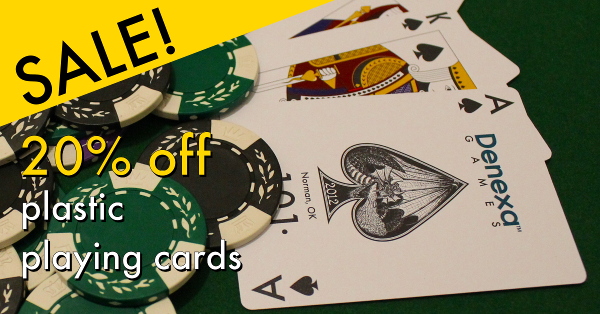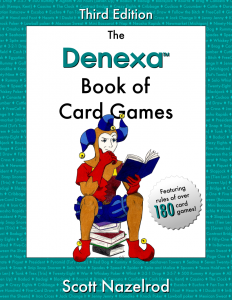Botifarra
Botifarra is a trick-taking game for four players in partnerships. Unlike many trick-taking games, Botifarra includes a number of rules restricting which cards can be played when. As a result, players are able to deduce information about what their opponents may hold.
The game originates from the disputed region of Catalonia (currently a province in the northeast corner of Spain, but which declared its independence in October 2017). The game is popular enough that organized duplicate-style tournaments are played there.
In Catalonia, Botifarra is traditionally played counter-clockwise (all action proceeding to the right). The description below is written to follow the clockwise fashion most card games follow. If you wish to play it the traditional way, just reverse the directions.
Object of Botifarra
The object of Botifarra is to be the first partnership to reach 101 or more points. Points are scored by collecting face cards, aces and 9s in tricks.
Setup
Botifarra is typically played with a 48-card Spanish deck. To make an equivalent deck from the 52-card English deck, like a deck of Denexa 100% Plastic Playing Cards, just remove the 10s. You also need something to keep score with, such as paper and pencil.
Determine partnerships by whatever method is convenient, either randomly or by mutual agreement. (Players often choose to play three games per session, so that each player may play one game partnered with each of the other players.) As is typical, players should be seated across from their partner. This ensures that the turn of play alternates between partnerships as it proceeds around the table.
Shuffle and deal twelve cards to each player (dealing out the entire pack).
Card ranking
In Botifarra, the highest card is the 9. All other cards rank in their usual order. The full rank of cards, therefore, is (high) 9, A, K, Q, J, 8, 7, 6, 5, 4, 3, 2 (low).
Game play
Determining trumps and doubling
Unlike in most other trick-taking games with trumps, there is no bidding or random trump selection in Botifarra. The dealer simply chooses a trump suit for the hand, or botifarra, which is to select no trumps. The dealer may also elect to pass the right to choose to their partner. (They cannot then pass the decision back to the dealer.)
After a trump suit has been chosen, the dealer’s opponents may choose to double, thereby doubling the points scored by the winner of the hand. If the hand is doubled, the dealer’s partnership may redouble, multiplying the value of the hand by four. The opponents can then reredouble, increasing the multiplier to eight. (This is the highest multiplier possible.) Players get the opportunity to speak in turn order from the last player to make a declaration.
A botifarra bid automatically doubles the value of the game, so
Play of the hand
The player to the dealer’s left leads any card they wish to the first trick. Each player in turn then plays one card to the trick. Once all four players have played a card, the highest trump played, or the highest card of the suit led if no trump was played, wins the trick.
Botifarra has a number of unique restrictions on which card you can play. First, of course, you must always follow suit if you can. Secondly, you must head the trick if you are able. The only exception to this is when the trick is currently being won by your partner. When this is the case, subject to suit-following rules, you may play any card worth points (9s, aces, or face cards). If you wish to play a card worth no points, it must be the lowest card you hold of the suit you’re playing in. (Because of this rule, your opponents are able to determine that any other cards that you hold of that suit must be higher.)
Once a player wins a trick, they place it face-down in a shared won-tricks pile located in front of either them or their partner. Tricks should be kept distinct from one another somehow, such as by putting them at right angles to the previous trick. Whichever player won the trick leads to the next one.
Scoring
Once all twelve tricks have been played, the players count up the value of their tricks captured, as follows:
- Tricks taken: 1 point each
- 9s: 5 points each
- Aces: 4 points each
- Kings: 3 points each
- Queens: 2 point each
- Jacks: 1 point each
The maximum trick score possible on one hand is 72 points. Whichever partnership scores more subtracts 36 from the value of their tricks to arrive at their score for the hand. This score is multiplied as decided before the hand and recorded on the scoresheet. (If the partnerships tie at 36 points each, neither team scores.)
Game play continues until one partnership exceeds 101 points. That partnership is the winner.




Leave a Reply